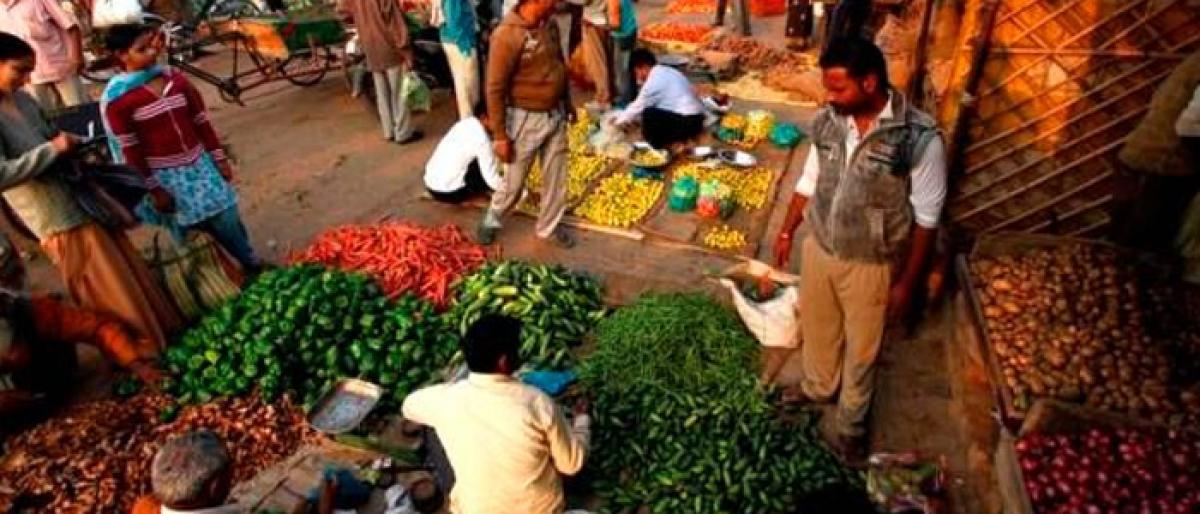India leads world in informal employment

Nearly 81% of all employed persons in India make a living by working in the informal sector, with only 6.5% in the formal sector and 0.8% in the household sector, according to a new ILO (International Labour Organisation) report \"Women and Men in the Informal Economy – A Statistical Picture (Third edition).\"
Nearly 81% of all employed persons in India make a living by working in the informal sector, with only 6.5% in the formal sector and 0.8% in the household sector, according to a new ILO (International Labour Organisation) report "Women and Men in the Informal Economy – A Statistical Picture (Third edition)."
A majority of women in India are informal workers. The statistics of the ILO report indicates that 95% of work force is in the informal sector. Within the informal economy, women are concentrated more in precarious jobs and lower-earning forms of works as compared to men in India. Women are less likely to be employers and more likely to be unpaid contributing family members or casual wage workers. They are being not paid for their work in their own homes, even they are not being paid if they render the service in the homes of others.
According to data, the total share of informal employment was 78% in 1999-00, it increased to 81% in 2016-17. Though the informal economy in India is estimated to diminish in size as formal employment expands, contrary to this, the trends have shown that informal sector economy is thriving in India. Employment creation has lagged far behind high rates of economic growth in India. Although India is widely known as the office of the world, data reveals that a small minority – only 13% – of urban workers were engaged in formal employment in the services sector.
Urban informal workers are the majority in cities. Although they feed the economic engine of our nation, their work and contributions largely go unrecognised. Consider four groups of urban informal workers in Indian cities: Home-based workers produce a wide variety of goods and services from their homes – from garments and textiles and prepared food, to electronic goods and automobile parts.
Street vendors provide affordable, convenient access to a wide range of goods and services in public places – from fresh fruits and vegetables to building materials, from crafts to consumer electronics, from prepared food to auto repairs.
Waste pickers provide a critical environmental service, extracting recyclable goods from the waste stream and preventing them from accumulating in landfills and dump sites. And domestic workers clean, cook and sometimes care for children or the elderly in private homes. These four groups of workers alone account for approximately a quarter of the total urban workforce in India.
Informal workers face a range of risks and barriers in their efforts to pursue their livelihoods, although these vary by group and are often especially pronounced for women. For example, waste pickers face occupational health and safety risks and are not integrated into solid waste management systems as service providers.
Street vendors are subject to arbitrary evictions or fines, and municipal officers often extract bribes from vendors to allow them to operate in public space. Home-based workers, who are predominantly women, are some of the most vulnerable informal workers as they are faced with assuming all of the costs and risks of production. They typically have very little bargaining power and are often exploited by middlemen who pay meager piece-rates or delay or even withhold pay. All of these groups of informal workers typically earn little and do not enjoy legal or social protection as workers.
Among the five South Asian countries, informalisation of labour is the highest in India and Nepal (90.7%), with Bangladesh (48.9%), Sri Lanka (60.6%) and Pakistan (77.6%) doing much better on this front. In fact, formal employment in Bangladesh is the highest in the region at 13.5%, but it also has high household employment at 26.7%, says the report.
Globally, two billion people – more than 61% of all employed people – work in the informal economy and 93% the world’s informal employment is in emerging and developing countries, with the level of education seen as a key factor. When the level of education increases, the level of informality decreases and the people who have completed the secondary and tertiary education are less likely to be in informal employment says the report.
Informal employment is a greater source of employment for men (63.0 per cent) than for women (58.1 per cent). Out of the two billion workers in informal employment worldwide, just over 740 million are women. Women are more exposed to informal employment in most low- and lower-middle income countries and are more often found in the most vulnerable situations.
The high incidence of informality in all its forms has multiple adverse consequences for workers, enterprises and societies and in particular is a major challenge for the realization of decent work for all and sustainable and inclusive development. However, when informal employment is the main source of employment, especially in emerging and developing countries, a high level of informality is observed in all sectors, the report notes.
“There is an urgent need to tackle informality. For hundreds of millions of workers, informality means a lack of social protection, rights at work and decent working conditions, and for enterprises it means low productivity and lack of access to finance. Data on those issues are crucial for designing appropriate and integrated policies that are tailored to the diversity of situations and needs," the report advises.
It also stresses the need to facilitate the transition of workers and economic units to the formal economy, to promote the creation, preservation and sustainability of enterprises and decent jobs in the formal economy and to prevent the informalization of formal economy jobs.














